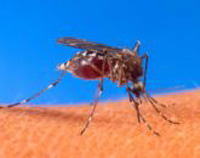Rare fever breaks out in Italy

Globalization and climate change could be very dangerous for the Western nations, Europe says, citing an obscure African fever that had broken out in Europe for the first time this past summer.
Nearly 300 cases of chikungunya fever, a virus that has previously only been common in Africa and Asia, were reported in Italy - where only isolated cases of the disease had ever been seen in the past.
"We were quite surprised," said Stefania Salmaso, director of Italy's Center for Epidemiology at the National Health Institute. "Nobody was expecting that such an unusual event was going to happen."
While the outbreak was largely the result of stronger trade and travel ties, some experts believe it is a sign of how global warming is creating European breeding grounds for diseases long confined to subtropical climates.
Officials at the European Centre for Disease Prevention and Control who investigated the outbreak said in a report last month that a particularly mild winter in Italy allowed mosquitoes to start breeding earlier than usual this year, giving the insect population a boost.
"This outbreak is most important as a warning signal," said Diarmid Campbell-Lendrum, a climate change expert at the World Health Organization. "Climate change affects the breeding of every mosquito on earth."
More mosquitoes will mean more disease. With warmer temperatures in the future, Europe might be hit by future outbreaks of diseases usually confined to Asia and Africa.
"With more movement of people and a changing climate, there will be shifting patterns of disease," Campbell-Lendrum said. "We need to be prepared for more surprises like this in the future."
Italian officials first grew suspicious in July, when dozens of people in the country's northeast complained of fevers, joint pain, headaches and rashes. Local doctors thought they had been bitten by sandflies.
Lab tests later confirmed an outbreak of chikungunya fever, a nasty disease spread by mosquitoes.
Officials believe the virus arrived when a tourist from southern India - where a chikungunya outbreak was already under way - accidentally imported the virus to the Italian province of Ravenna. The Asian tiger mosquito, which can spread the disease, had already landed in Italy nearly two decades earlier.
Experts are also nervous because the Asian tiger mosquito that spread chikungunya in Italy might be capable of spreading more dangerous diseases like dengue, a sometimes hemorrhagic fever, and yellow fever, a virus that causes jaundice, muscle pain, vomiting and kills about seven percent of those it infects.
"Dengue would certainly be more worrying than chikungunya," said Dr. Denis Coulombier, ECDC's head of preparedness and response. "It is something we need to keep an eye on, because the possibility is there."
Most scientists think that Europe's advanced health systems and high living standards will help the continent avoid widespread disease. For instance, malaria was once endemic in much of Europe but disappeared once the swamps that bred mosquitoes were replaced by concrete skyscrapers, and medicines to treat malaria became widely available.
But modernization won't deter all mosquitoes. Certain disease-carrying species prefer artificial breeding sites like rain-filled gutters and plastic containers. "If the climate gets suitable enough, then even very high living standards won't necessarily protect you," Campbell-Lendrum said.
Despite having one of the world's best health care systems and a high standard of living, Singapore also records thousands of dengue cases every year. This past summer, about 300 people every week were infected in the island state.
Though Italy's chikungunya outbreak has essentially been contained, "the big question is what is going to happen in the spring next year," said Coulombier.
It's possible that some of the disease-carrying mosquitoes and their eggs could survive the winter, and hatch, ready to infect, next year. Or another virus-infected traveler from Asia or Africa could ignite a new outbreak next year.
Other European countries should pay attention.
"Italy is not the only country that needs to prepare for another outbreak," said Dr. Evelyn Depoortere, a chikungunya expert at the ECDC. "Southern European countries around the Adriatic coast like Greece, France and Spain are also at risk."
As long as temperatures continue to rise, health officials say current disease detection and response systems need to be reinforced.
"Climate change is one more factor pushing us in the direction of more disease," said Campbell-Lendrum. "With warmer weather, it is very likely we will have diseases popping up in Europe that no one had ever expected to see."
Subscribe to Pravda.Ru Telegram channel, Facebook, RSS!


